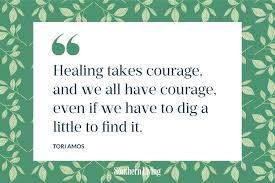The Power of Healing: Nurturing the Mind, Body, and Soul
Healing is a profound process that encompasses the restoration of balance and harmony within the mind, body, and soul. It is not merely about curing physical ailments but also about addressing emotional wounds and spiritual imbalances. True healing involves a holistic approach that considers all aspects of a person’s well-being.
Physical healing involves treating the symptoms of illness or injury through medical intervention, therapies, and lifestyle changes. It is essential to take care of our bodies by nourishing them with proper nutrition, exercise, rest, and regular check-ups to maintain optimal health.
Emotional healing is equally important as it involves acknowledging and processing feelings such as grief, anger, fear, and sadness. Through practices like therapy, journaling, meditation, and self-care activities, individuals can heal emotional wounds and cultivate resilience in the face of life’s challenges.
Spiritual healing delves into the realm of connecting with one’s inner self and finding meaning and purpose in life. This can be achieved through practices like prayer, meditation, mindfulness, or engaging in activities that nurture the soul and foster a sense of belonging to something greater than oneself.
Healing is not a linear process; it requires patience, compassion, and dedication to one’s well-being. It is about listening to our bodies’ signals, honoring our emotions without judgment, and nurturing our spiritual essence with love and acceptance.
Ultimately, true healing is about restoring wholeness within ourselves so that we can live authentically and vibrantly in alignment with our true essence. By embracing a holistic approach to healing that nurtures the mind, body, and soul, we can embark on a transformative journey toward greater well-being and fulfillment.
Understanding Healing: Answers to 9 Frequently Asked Questions
- What is healing?
- How does healing work?
- What are the different types of healing?
- Can healing help with physical ailments?
- Is emotional healing important for overall well-being?
- What role does spirituality play in the healing process?
- Are there alternative methods of healing besides traditional medicine?
- How long does it take to experience healing?
- How can I support my own healing journey?
What is healing?
Healing is a multifaceted process that goes beyond just the physical mending of wounds or illnesses. It involves the restoration of balance and harmony within the mind, body, and soul. Healing encompasses not only the alleviation of physical symptoms but also the nurturing of emotional well-being and spiritual growth. It is a holistic journey that addresses all aspects of an individual’s health and vitality, aiming to promote overall wellness and inner peace. True healing involves embracing self-care practices, seeking support when needed, and cultivating a sense of wholeness that allows for personal growth and transformation.
How does healing work?
Healing operates through a complex interplay of physical, emotional, and spiritual processes that work together to restore balance and promote well-being. Physically, healing involves the body’s natural ability to repair and regenerate tissues, aided by medical interventions, therapies, and lifestyle changes. Emotionally, healing entails acknowledging and processing deep-seated emotions, traumas, and psychological wounds to foster inner resilience and emotional well-being. Spiritually, healing connects individuals to their inner selves, higher purpose, or universal energies that provide comfort, guidance, and a sense of wholeness. Ultimately, healing works through a holistic integration of these aspects to promote overall health and vitality in individuals seeking restoration and transformation.
What are the different types of healing?
There are various types of healing modalities that encompass physical, emotional, and spiritual aspects of well-being. Some common types of healing include conventional medicine, which focuses on treating physical ailments with medications and procedures; alternative therapies like acupuncture, chiropractic care, and herbal remedies that aim to restore balance in the body’s energy systems; psychological therapies such as counseling and cognitive-behavioral therapy that address emotional wounds and mental health issues; and spiritual practices like meditation, prayer, and energy healing that seek to align individuals with their higher selves or a greater source of universal energy. Each type of healing offers unique approaches to promoting overall wellness and restoring harmony within the mind, body, and soul.
Can healing help with physical ailments?
Healing can indeed play a significant role in addressing physical ailments. While medical interventions are crucial for treating physical conditions, incorporating healing practices can complement traditional treatments and support the body’s natural ability to heal itself. Techniques such as energy healing, acupuncture, massage therapy, and mindfulness have been shown to reduce pain, inflammation, and stress levels, promoting overall well-being and enhancing the body’s healing process. By addressing not only the physical symptoms but also the underlying emotional and spiritual aspects of an individual, healing approaches can contribute to a more comprehensive and holistic recovery from physical ailments.
Is emotional healing important for overall well-being?
Emotional healing is undeniably crucial for overall well-being as it directly impacts our mental, physical, and spiritual health. Addressing emotional wounds and traumas is essential for cultivating resilience, fostering healthy relationships, and promoting a sense of inner peace and balance. When we prioritize emotional healing, we create space for self-awareness, self-compassion, and personal growth. By acknowledging and processing our emotions in a healthy way, we can release pent-up negativity, reduce stress levels, and enhance our overall quality of life. Emotional healing empowers us to navigate life’s challenges with greater clarity, empathy, and emotional stability, ultimately leading to a more fulfilling and harmonious existence.
What role does spirituality play in the healing process?
Spirituality plays a significant role in the healing process by providing individuals with a sense of purpose, connection, and inner strength. It offers a framework for understanding the deeper meaning behind illness or suffering and can serve as a source of comfort, hope, and resilience during challenging times. Spiritual practices such as prayer, meditation, mindfulness, or engaging in rituals can help individuals cultivate a sense of peace, acceptance, and empowerment as they navigate their healing journey. By integrating spirituality into the healing process, individuals can tap into their inner resources, find solace in times of distress, and experience a profound sense of wholeness that transcends physical recovery.
Are there alternative methods of healing besides traditional medicine?
There are indeed alternative methods of healing available besides traditional medicine. These alternative approaches often focus on treating the root causes of ailments and promoting holistic well-being by considering the interconnectedness of the mind, body, and spirit. Practices such as acupuncture, herbal medicine, chiropractic care, meditation, yoga, and energy healing modalities like Reiki offer individuals a complementary or alternative path to healing that may align more closely with their beliefs and preferences. While traditional medicine plays a crucial role in healthcare, exploring alternative methods can provide additional options for those seeking a more personalized and integrative approach to their healing journey.
How long does it take to experience healing?
The duration of the healing process can vary significantly depending on various factors such as the nature of the condition, individual physiology, emotional state, and the chosen healing modalities. While some individuals may experience immediate relief or improvement after a single session, others may require consistent and long-term care to achieve lasting healing. It’s important to approach the healing journey with patience, openness, and commitment, allowing the body, mind, and soul to integrate the changes and progress at their own pace. Remember that healing is a unique and personal journey that unfolds gradually over time, with each step contributing to a deeper sense of well-being and wholeness.
How can I support my own healing journey?
Supporting your own healing journey involves a combination of self-awareness, self-care practices, and a willingness to embrace growth and transformation. Start by listening to your body and mind, acknowledging your emotions, and understanding your needs. Engage in activities that promote physical well-being, such as eating nutritious foods, getting regular exercise, and prioritizing rest and relaxation. Cultivate emotional resilience through practices like journaling, therapy, or mindfulness meditation to process feelings and release emotional blockages. Embrace spiritual practices that resonate with you, whether it’s prayer, meditation, or connecting with nature. Remember that healing is a personal journey that requires patience, compassion, and a commitment to nurturing all aspects of yourself – mind, body, and soul.



